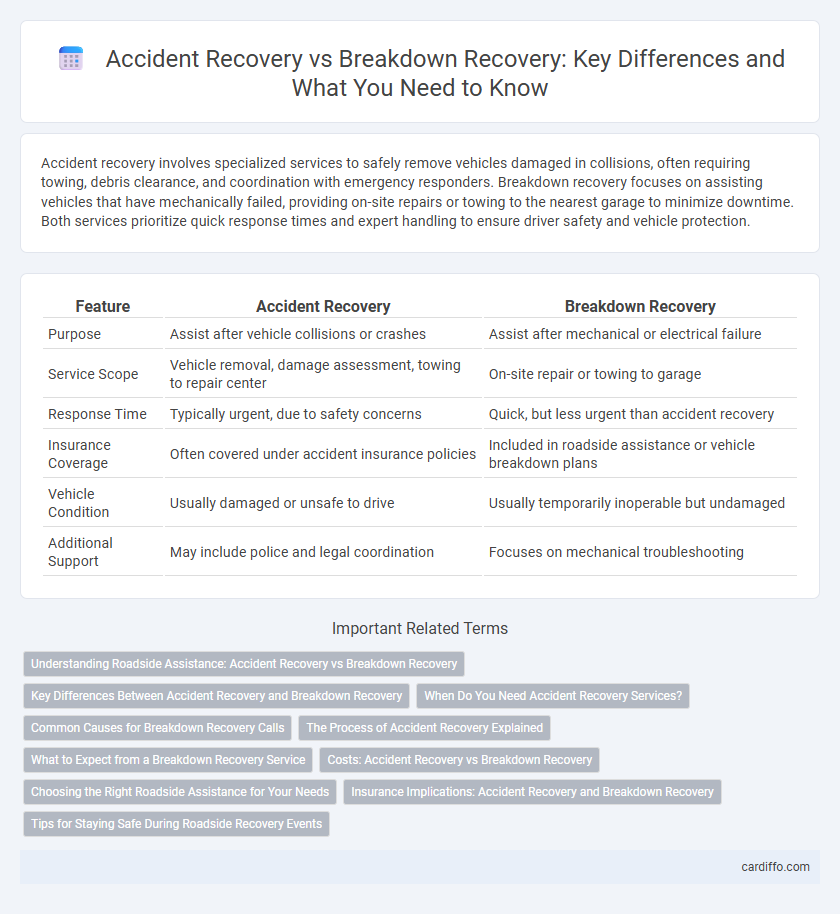Accident recovery involves specialized services to safely remove vehicles damaged in collisions, often requiring towing, debris clearance, and coordination with emergency responders. Breakdown recovery focuses on assisting vehicles that have mechanically failed, providing on-site repairs or towing to the nearest garage to minimize downtime. Both services prioritize quick response times and expert handling to ensure driver safety and vehicle protection.
Table of Comparison
| Feature | Accident Recovery | Breakdown Recovery |
|---|---|---|
| Purpose | Assist after vehicle collisions or crashes | Assist after mechanical or electrical failure |
| Service Scope | Vehicle removal, damage assessment, towing to repair center | On-site repair or towing to garage |
| Response Time | Typically urgent, due to safety concerns | Quick, but less urgent than accident recovery |
| Insurance Coverage | Often covered under accident insurance policies | Included in roadside assistance or vehicle breakdown plans |
| Vehicle Condition | Usually damaged or unsafe to drive | Usually temporarily inoperable but undamaged |
| Additional Support | May include police and legal coordination | Focuses on mechanical troubleshooting |
Understanding Roadside Assistance: Accident Recovery vs Breakdown Recovery
Accident recovery focuses on safely removing vehicles involved in collisions, often requiring specialized equipment to manage damaged or obstructed vehicles and clear roadways. Breakdown recovery deals with mechanical failures, such as engine troubles or flat tires, providing prompt repairs or towing to restore mobility. Understanding these distinctions ensures appropriate roadside assistance tailored to the nature of the incident, enhancing safety and minimizing delays.
Key Differences Between Accident Recovery and Breakdown Recovery
Accident recovery focuses on safely removing vehicles involved in collisions, addressing potential hazards and coordinating with emergency services to clear the scene promptly. Breakdown recovery involves repairing or towing vehicles that have malfunctioned due to mechanical failure, ensuring minimal disruption to the driver's journey. Key differences include the level of urgency, the involvement of law enforcement, and the specific equipment required for safely recovering vehicles from accident sites versus mechanical breakdowns.
When Do You Need Accident Recovery Services?
Accident recovery services are necessary when a vehicle is involved in a collision, rendering it immobile or unsafe to drive. These specialized services include safe removal of damaged vehicles, clearing debris, and often coordinating with emergency responders to ensure road safety. Unlike breakdown recovery, which handles mechanical failures or flat tires, accident recovery requires expertise in handling wreckage and securing accident scenes to prevent further hazards.
Common Causes for Breakdown Recovery Calls
Common causes for breakdown recovery calls include engine failure, flat tires, dead batteries, and fuel depletion, which immobilize vehicles and require immediate assistance. Roadside recovery services prioritize rapid response to these issues to minimize delays and ensure safety. Unlike accident recovery, which involves vehicle towing after collisions, breakdown recovery focuses on resolving mechanical faults or providing on-site repairs.
The Process of Accident Recovery Explained
Accident recovery involves a detailed process starting with securing the accident scene to ensure safety, followed by assessing vehicle damage and coordinating with emergency services if necessary. Specialized recovery equipment is used to remove vehicles safely and clear debris, minimizing traffic disruption and preventing further hazards. This comprehensive approach contrasts with simpler breakdown recovery, which primarily focuses on repairing or towing a disabled vehicle without the complexities of accident scene management.
What to Expect from a Breakdown Recovery Service
Breakdown recovery services provide swift assistance when your vehicle malfunctions, often resolving issues on-site or arranging tow services to the nearest repair facility. Expect professional technicians equipped with tools to diagnose and fix common problems such as flat tires, dead batteries, or fuel delivery issues. Efficient communication and tracking systems ensure timely rescue, minimizing downtime and stress during vehicle breakdowns.
Costs: Accident Recovery vs Breakdown Recovery
Accident recovery typically incurs higher costs than breakdown recovery due to the extensive services required, such as vehicle extraction, repair assessments, and sometimes tow to specialized facilities. Breakdown recovery focuses primarily on simple fixes like battery jumps, tire changes, or towing to a nearby garage, which generally results in lower fees. Insurance coverage and roadside assistance plans often influence the final costs for both accident and breakdown recovery services.
Choosing the Right Roadside Assistance for Your Needs
Accident recovery specializes in safely removing vehicles after collisions, addressing damage assessment and traffic management, while breakdown recovery focuses on resolving mechanical failures to get you back on the road quickly. Selecting the right roadside assistance depends on your specific situation, whether involving accident-related hazards or unexpected vehicle malfunctions. Tailoring your choice ensures faster response times, appropriate equipment, and comprehensive support for your unique recovery requirements.
Insurance Implications: Accident Recovery and Breakdown Recovery
Accident recovery involves specialized services to manage vehicle damage and legal documentation after collisions, often influencing insurance claims and potential premium adjustments. Breakdown recovery focuses on mechanical failures or malfunctions, with policies typically covering towing and on-site repairs without extensive claims impact. Understanding the insurance differentiation between accident and breakdown recovery ensures appropriate coverage and cost management following roadside emergencies.
Tips for Staying Safe During Roadside Recovery Events
During roadside recovery events, maintaining a safe distance from traffic and using hazard lights are critical for accident recovery and breakdown recovery scenarios. Wearing high-visibility clothing and placing reflective warning triangles at appropriate intervals help alert other drivers and reduce the risk of secondary collisions. Always stay inside the vehicle if it's safe, or behind barriers if available, to minimize exposure to oncoming traffic during emergency roadside assistance.
Accident Recovery vs Breakdown Recovery Infographic

 cardiffo.com
cardiffo.com